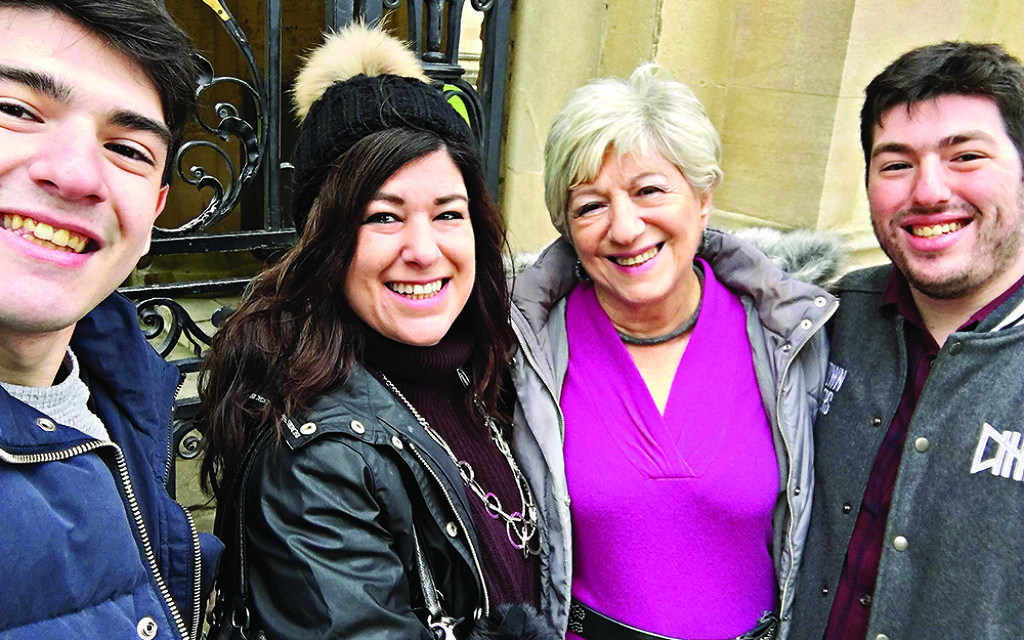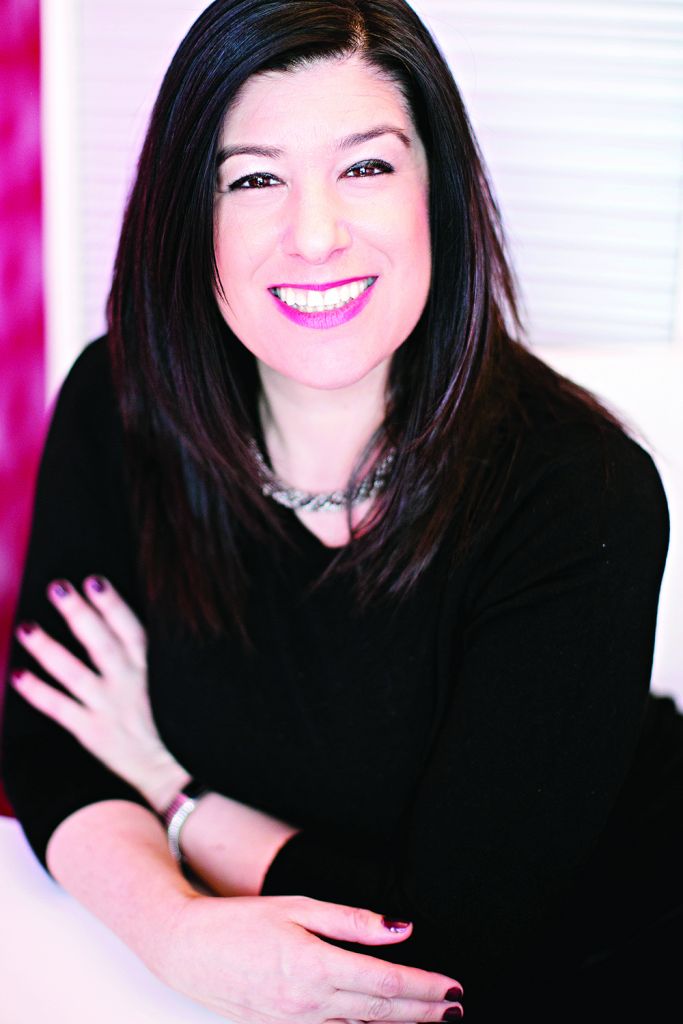Battling ovarian cancer, refusing to be beaten
Ingrid Copperman tells Francine Wolfisz why she wants greater awareness of ovarian cancer and the BRCA gene

A chance remark to friends convinced Ingrid Copperman the niggling pain in her stomach might be something to worry about after all.
Convinced her lower abdominal pain was caused by muscle strain during an exercise class, the 48-year-old mum-of-two was surprised to learn others only complained of achy arms and legs after exercising.
“I thought that was a bit strange, that I’m the only one with a sore stomach,” reveals Ingrid, who lives in Rickmansworth.
Get The Jewish News Daily Edition by email and never miss our top stories Free Sign Up
Despite initial fears it was something more sinister, friends and family assured her it was probably nothing.
After seeing her GP, followed by a gynaecologist at Spire Bushey Hospital, she was again informed her symptoms were unremarkable. A scan picked up a small, harmless cyst on her left ovary and Ingrid was told she most likely had irritable bowel syndrome.
But in the back of her mind, Ingrid could not shake the terrible thought that she was displaying the symptoms of ovarian cancer – a condition with which she had become familiar through her work as a virtual assistant for Cancer 52, an organisation dealing with rare forms of the disease.
On the morning of her son’s 18th birthday, Ingrid received a phone call that changed everything.
“The consultant’s secretary called to tell me one of my blood test results had come back as raised, so they wanted to send me for a CT scan.
“I asked which one, and she said it was ‘CA125’. When I Googled it, there it was in front of my eyes – a raised level can indicate ovarian cancer.”
While a normal range is 0 to 35, Ingrid’s level had been measured as 75. Still, the CT scan revealed nothing untoward, but a repeated blood test a few weeks later showed her level had now increased to 275.
With her emotions going through a rollercoaster ride of fear and reassurance, doctors were finally able to see what was going on following an MRI scan – a cyst, tucked behind her womb, on her right ovary.

Ingrid was reassured there was a 90 percent chance the tumour was benign, but doctors would treat it as cancer and perform a hysterectomy.
Ingrid was still recovering and woozy from the effects of anaesthetic and morphine, when the consultant delivered the news. “He said: ‘We have found disease in your ovary, your womb and your fallopian tubes.”
At a follow-up appointment, the consultant informed Ingrid they had also found cancer in five of the lymph nodes removed during her surgery. Finally she had a diagnosis, but it was one she had prayed would never happen: Stage 3, high-grade serous ovarian cancer.
“Despite the odds, I had been right all along,” reveals Ingrid. “I was really surprised it had got to stage three. It had all gone so quickly, just three months from seeing my GP to having an operation. I was shocked it had been so rapid.”
For the next 18 weeks, Ingrid embarked on a relentless weekly regime of chemotherapy, which left her feeling exhausted. She credits wearing a cooling cap during treatment with helping to reduce the effects of hair loss.
“It was hugely successful for me. Because I didn’t look like a cancer patient, I didn’t feel so much like one.”
The initial results for Ingrid were good. Blood tests in December showed she was cancer free but, earlier this month, her consultant said her blood levels were back up again owing to microscopic remnants of the disease.
Now Ingrid, who will soon embark on another round of chemotherapy, wants others to become more alert to the disease during Ovarian Cancer Awareness Month.

Symptoms include pelvic or abdominal pain, bloating, a feeling
of fullness and increased urination.
Every year, around 7,300 women in the UK are diagnosed with ovarian cancer and the disease claims the lives of 11 women every day.
Early stage symptoms can be subtle or misinterpreted, meaning
45 percent of women will wait around three months from first visiting their GP to get a correct diagnosis.
Those from an Ashkenazi-Jewish background are 10 times more likely to carry the BRCA1 or BRCA2 mutation, putting them at much greater risk of ovarian and breast cancer.
Following her cancer diagnosis, Ingrid asked to be tested and discovered she has the BRCA1 mutation.
She now plans to speak to a counsellor at Chai Cancer Care to discuss her options for the future. This includes opting for a double mastectomy which, although radical, could reduce her chances of developing breast cancer by 95 percent.
At present, the BRCA gene test is only available to people who have had breast or ovarian cancer, or a family history of the disease.
Ingrid believes there should be a wider screening programme available, given there is a higher risk among the Ashkenazi-Jewish community.
“I don’t have a family history, but had I been tested and known I had the BRCA gene mutation, I could have taken preventative steps so I didn’t get cancer. When I got married, my ex-husband and I were both encouraged to have a genetic test for Tay Sachs. Why is there not a similar screening programme for BRCA for the Jewish community?”
Looking to the future, Ingrid praises her “amazingly supportive” partner, Neil, 56 (pictured left) and sons, Antony, 21, and Charlie, 19 (above, with Ingrid’s mother), in getting her through her treatment.
“There are still many positives,” she adds. “I’m still here. I’ve got two amazing sons, a lovely partner and great friends who are supporting me.
I refuse to be beaten.”

Thank you for helping to make Jewish News the leading source of news and opinion for the UK Jewish community. Today we're asking for your invaluable help to continue putting our community first in everything we do.
For as little as £5 a month you can help sustain the vital work we do in celebrating and standing up for Jewish life in Britain.
Jewish News holds our community together and keeps us connected. Like a synagogue, it’s where people turn to feel part of something bigger. It also proudly shows the rest of Britain the vibrancy and rich culture of modern Jewish life.
You can make a quick and easy one-off or monthly contribution of £5, £10, £20 or any other sum you’re comfortable with.
100% of your donation will help us continue celebrating our community, in all its dynamic diversity...
Engaging
Being a community platform means so much more than producing a newspaper and website. One of our proudest roles is media partnering with our invaluable charities to amplify the outstanding work they do to help us all.
Celebrating
There’s no shortage of oys in the world but Jewish News takes every opportunity to celebrate the joys too, through projects like Night of Heroes, 40 Under 40 and other compelling countdowns that make the community kvell with pride.
Pioneering
In the first collaboration between media outlets from different faiths, Jewish News worked with British Muslim TV and Church Times to produce a list of young activists leading the way on interfaith understanding.
Campaigning
Royal Mail issued a stamp honouring Holocaust hero Sir Nicholas Winton after a Jewish News campaign attracted more than 100,000 backers. Jewish Newsalso produces special editions of the paper highlighting pressing issues including mental health and Holocaust remembrance.
Easy access
In an age when news is readily accessible, Jewish News provides high-quality content free online and offline, removing any financial barriers to connecting people.
Voice of our community to wider society
The Jewish News team regularly appears on TV, radio and on the pages of the national press to comment on stories about the Jewish community. Easy access to the paper on the streets of London also means Jewish News provides an invaluable window into the community for the country at large.
We hope you agree all this is worth preserving.
-
By Brigit Grant
-
By Laurent Vaughan - Senior Associate (Bishop & Sewell Solicitors)
-
By Laurent Vaughan - Senior Associate (Bishop & Sewell Solicitors)
-
By Laurent Vaughan - Senior Associate (Bishop & Sewell Solicitors)
-
By Laurent Vaughan - Senior Associate (Bishop & Sewell Solicitors)





















